Some users reported that they receive KERNEL AUTO BOOST LOCK ACQUISITION WITH RAISED IRQL BSOD while using Bluetooth devices or due to wireless adapters. Not only that, according to some reports, some system were connected to a wireless hard drive and the BSOD occurred as soon as the user started using it. This is a very serious issue and should be resolved pretty quickly.
The KERNEL_AUTO_BOOST_LOCK_ACQUISITION_WITH_RAISED_IRQL bug check has a value of 0x00000192. This indicates that a lock tracked by AutoBoost was acquired while executing at DISPATCH_LEVEL or above.
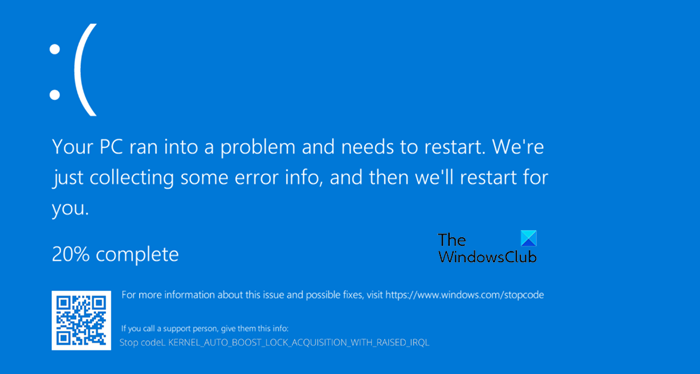
Fix KERNEL AUTO BOOST LOCK ACQUISITION WITH RAISED IRQL Blue Screen
When users connect Bluetooth devices, wireless adapters, or any external device to the system, they may face KERNEL AUTO BOOST LOCK ACQUISITION WITH RAISED IRQL BSOD. Updating or rolling back your Bluetooth drivers can usually help. Now because of this wide range of scenarios, we have accumulated several solutions that can help you resolve this issue. Go through the list and see which may apply in your case.
- Remove the external hard drive
- Run Microsoft Online BSOD Troubleshooter
- Disable Bluetooth from BIOS and update the driver
- Roll back the driver/s for the Bluetooth-powered devices to the previous version
- Uninstall the Wireless adapter driver
- Remove the NDAS device from your system
- Perform a System Restore
Let’s try to resolve the issue using the prescribed steps.
1] Disconnect the external hard drive
One of the main causes of said error is an external hard disk drive that you have connected to your computer. As per some reports, the computer of the victims is working fine after removing the external hard disk without any additional BSOD crashes. The reason for this issue can also be that you have a bad sector in your HDD or the hardware has malfunctioned. To resolve this issue, disconnect the external HDD from the USB when the computer is turned off.
2] Run Microsoft Online BSOD Troubleshooter
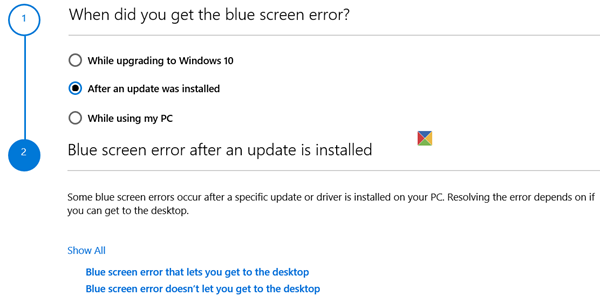
If none of the methods mentioned above worked for you, you should run the Microsoft Online BSOD Troubleshooter to fix the Kernal BSOD. This is a free tool from Microsoft that will scan the cause of the issue and resolve it. So, go ahead and run Microsoft Online BSOD Troubleshooter, after doing the same, check if the issue is resolved.
3] Disable Bluetooth Settings from BIOS and update the driver
Some users are facing the same issue and they have resolved their issue by disabling the Bluetooth from BIOS. The reason is pretty simple, we will disable Bluetooth settings from BIOS and then if the issue is resolved, we will update the BIOS.
To do the same, boot into BIOS, and then look for your Bluetooth. Mostly, it will be present inside Security > I/O Port Access. Keep in mind though, BIOS settings depend on the system’s OEM, so, you might have to do a google search in case you can’t find Bluetooth.
In case, after disabling Bluetooth, your issue is resolved, there is a high chance that your issue is a result of a bad driver. In that case, the very first thing you should do is update it. In order to do the same, either go to Device Manager and update your Bluetooth driver or download the latest version of the Bluetooth driver from the manufacturer’s website, either way, you will be good to go.
If after updating the driver or after disabling Bluetooth settings, your issue persists, move to the next solution.
Read: How to find which Driver is causing the Blue Screen on Windows?
4] Roll back the Bluetooth mice driver or other Bluetooth-powered devices to the previous
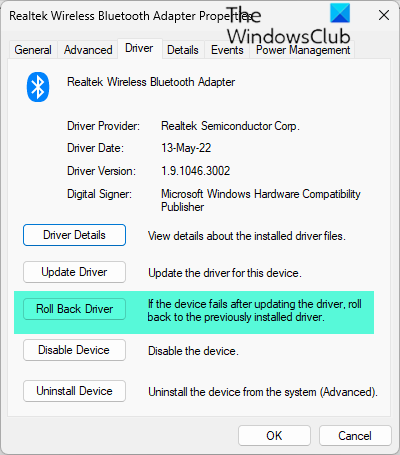
The error in question can be due to a Bluetooth-powered mouse, if is running a buggy version, there is a high chance that you will see a BSOD. In that case, you need to roll back the driver of the mouse to fix the problem. To resolve this use the prescribed solution.
- Press Windows + R key to open the Run dialog box.
- Write devmgmt.msc to open Device Manager.
- Once the Device Manager opens, click on Mice and other pointing devices.
- Now, right-click on the Mouse Bluetooth driver and choose Properties.
- In the properties screen, expand the Driver button and click on Roll Back Driver.
- Complete the on-screen instruction to revert to the older driver version. Once the process is complete, restart your computer.
In case, the Roll Back button is greyed out, you need to update the driver using any of the methods mentioned above, as the older version is absent on your system. Hopefully, after rolling back the Bluetooth mice driver your problem will be resolved.
If using another Bluetooth device instead of or alongside the mouse, you may have to roll back it as well.
5] Uninstall the Wireless adapter driver
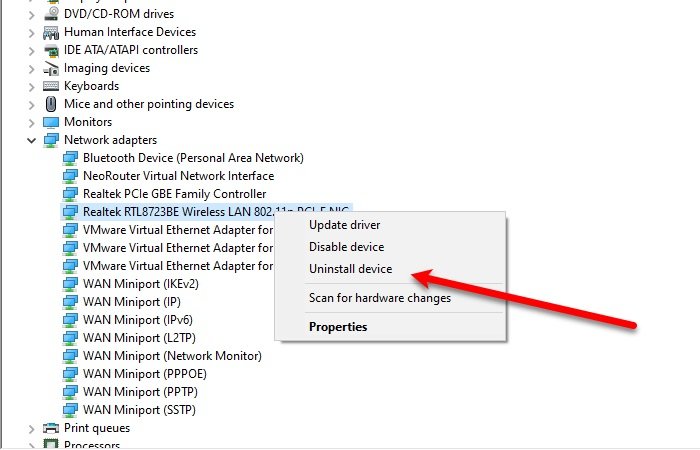
There can be many reasons for this problem, among them are issues related to Wireless adapters. To fix this issue, uninstalled the Wireless network driver adapter from your computer. In order to fix this issue use the prescribed solution.
- Press Windows + R key to open the Run dialog box.
- Write devmgmt.msc to open Device Manager.
- Once the Device Manager opens, expand the Network adapters.
- Now, right-click on the Wireless Network adapter and choose Uninstall device
- Once the driver is uninstalled, restart your computer.
Hopefully, uninstalling the wireless adapter driver will resolve the issue.
6] Remove the NDAS device from your system
It has also been seen that users face this problem due to their connected Network Direct Attached Storage (NDAS) driver as there are a lot of manufacturers that have not developed optimized drivers for Windows 11/10, leading to abrupt crashing and BSOD. And they have resolved the issue immediately by disconnecting the NDAS system; therefore, to fix the said error, disconnect the storage device from the computer.
7] Perform a System Restore
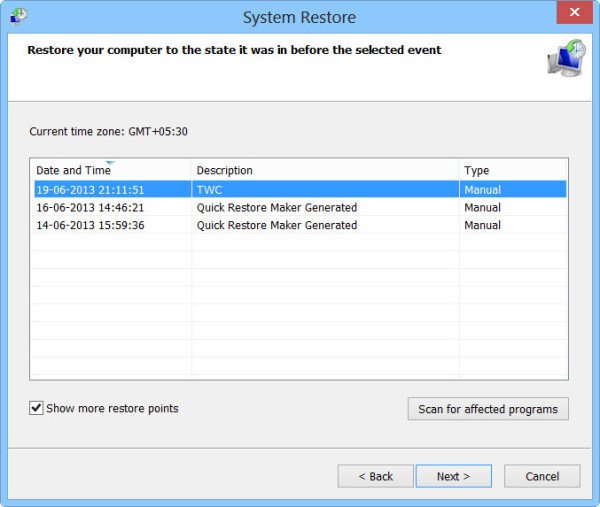
If your problem is not solved yet then use the system restore feature. System Restore will put your computer in the state when you were not facing any such issues. So, go ahead and do System Restore. This will resolve the issue for you. Hopefully, after using the system restore feature your problem will be resolved, if not, move the last solution.
Hopefully, you are able to resolve the issue using the solutions mentioned in this post.
Read: USB tethering causes Blue Screen on Windows.
What is KERNEL AUTO BOOST INVALID LOCK RELEASE?
The KERNEL_AUTO_BOOST_INVALID_LOCK_RELEASE Blue Screen has a value of 0x00000162. This indicates that a lock tracked by AutoBoost was released by a thread that did not own the lock. It usually occurs when hen watching a movie, opening certain programs, playing some game, etc.